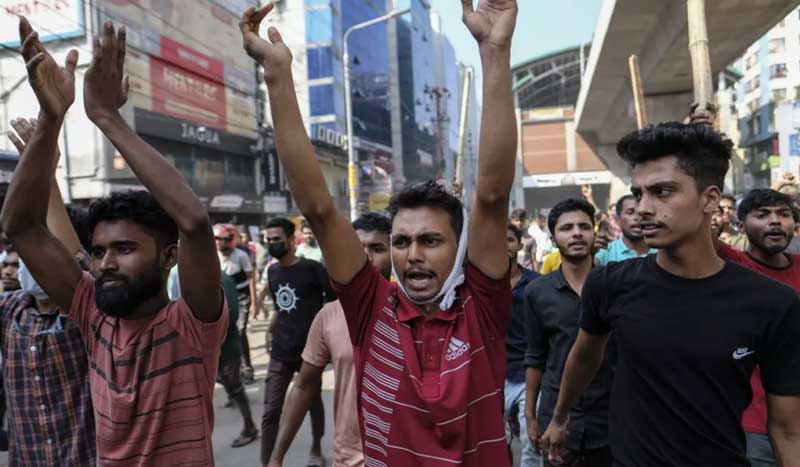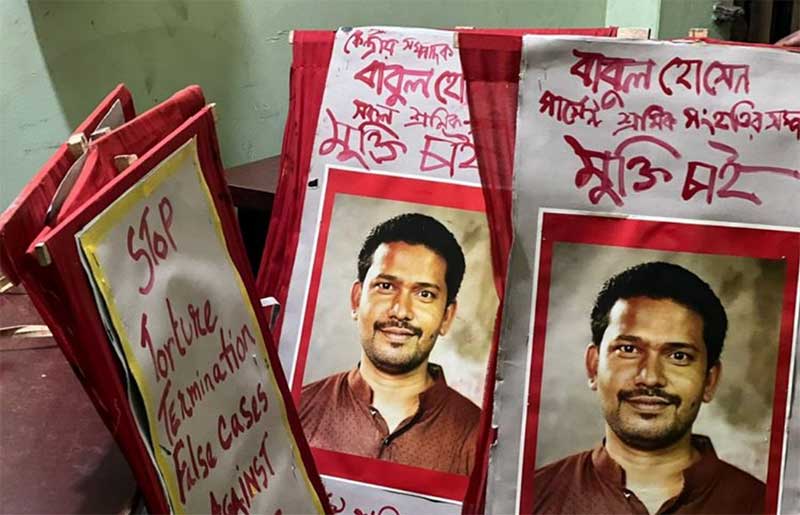Originally posted in Les Echos on 1 January 2024

In mid-November, violent protests over wages blocked hundreds of factories in the Dhaka region, capital of Bangladesh. The crisis illustrates the running out of steam in the textile sector, unable to move up the value chain to better pay its workers. Western brands areaccused of taking advantage of the situation.
A large red banner, signs with the portrait of a man, a sound system spitting slogans at full volume: this December 8 in front of the Press Club of Dhaka, around twenty members of the Bangladesh Garment Workers’Solidarity (BGWS), a textile workers union, came to demand the release of several of their leaders.
The man whose smiling face appears large on the placards has a name: Babul Hossain. Along with others, this activist was arrested on November 15, after demonstrations by workers demanding a substantial increase in the minimum wage while galloping inflation is eating into the already meager budget of these poor workers.
Babul Hossain was charged with “incitement to violence” and “vandalism”. “The accusations are fabricated,” explains to “Echos” Taslima Akhter, the president of the BGWS, who shouts into a microphone in the front row of the procession. A little behind, police officers in turquoise shirts and rangers keep watch while chatting.
The huge demonstrations in mid-November paralyzed several hundred textile factories in the Dhaka region, weakening one of the pillars of the Bangladeshi economy. Thousands of workers took to the streets, organizing blockades to demand a substantial revaluation of the minimum wage, stuck at 8,000 takas per month (67 euros) since 2018. A “poverty wage”, which illustrates the abuses of textile industry in Bangladesh, regularly accused of violating workers’ rights with the blessing of the government.
Four workers killed
The demonstrations were violently repressed. A total of 4 workers were killed during clashes with the police. Several thousand others, including Babul Hossain, were imprisoned without further trial. “The government has not chosen the path of negotiation, but that of repression. We live in constant fear of being arrested,” continues Taslima Akhter, who denounces the authoritarian drift of Prime Minister Sheikh Hasina, in power since 2009.

movement. He was arrested by police on November 15. (The echoes)
The demands of the unions, which pushed for a tripling of the minimum wage to 25,000 takas (211 euros), were ignored by the employers, who nevertheless agreed to set a new minimum wage at 12,500 takas (105 euros). Deemed insufficient, the increase did not calm the anger of certain workers, who continued to block the roads of the capital. The movement eventually ran out of steam – workers fearing police reprisals, loss of wages and dismissal.
The bosses provide minimum service
For bosses, the increase granted is more than sufficient. “Do you know many countries that increase workers by 56% at once? », argues Siddiqur Rahman, the former president of the Bangladesh Garment Manufacturers and Exporters Association (BGMEA), the all-powerful union of textile barons.
The man receives in a spacious office installed at the top of the BGMEA headquarters, a fortress of concrete and glass where the call to prayer launched by a muezzin resonates five times a day.
Preserve the bosses’ margins
With his three factories, this businessman who started from nothing alone has a turnover of more than $300 million and employs 20,000 workers in Dhaka and its surrounding areas. He is also the Secretary of State for Commerce and Industry in Sheikh Hasina’s government and sits on the committee which sets the minimum wage for workers in the sector.
“Besides, where am I supposed to get the money to increase them further?” », continues the businessman, knocking his rose gold Rolex on his green marble desk. “Our margins are slim,” he swears. And, according to him, any additional increase in wages would force many factories to close down because they would then go into the red.
This argument is widely refuted by professional unions: “When we ask bosses to increase wages, they systematically respond that they cannot afford it. It’s false: their business is doing well, scathes Taslima Akhter of the BGWS. For their part, the workers struggle to feed themselves.
Intractable foreign buyers
“The problem is that buyers are not paying the right price for our clothes. If they paid a higher price, then we could increase wages,” argues Siddiqur Rahman, whose clients include H&M, Gap, Benetton, Mango, but also Jules, the French ready-to-wear brand owned by Mulliez group.
After the Rana Plaza disaster, which left 1,100 dead in 2013, Western brands committed to ensuring better working conditions for Bangladeshi workers. An agreement has been signed between buyers and suppliers. And experts recognize that working and safety conditions have generally improved.
Bangladesh caught in its own trap
Accused of having made immense profits from the corpses of Bangladeshi workers, the textile giants also pledged to pay suppliers better. “We have never seen the color of money,” growls Siddiqur Rahman from his luxurious office. However, he would like to point out that the Swedish H&M, his biggest client, is the only one to have kept its promises and to have agreed to renegotiate its prices upwards.
The sector is struggling to impose its conditions on the big names in global textiles. ” We have nothing. We have to import all our raw materials, including cotton. We do not have a deep water port, which means that cargoes sometimes have to be sent to Singapore or Colombo for transshipment, which wastes time, Siddiqur Rahman slowly recounts.
And yet, we are the second largest clothing producer in the world. Why do buyers take this risk? Because salaries are low. This is the only argument that works in our favor, he smiles. If we increase salaries too much, customers will go elsewhere: to Vietnam, to Cambodia…”
Malnourished workers
According to estimates from the Center for Policy Dialogue (CPD), one of the country’s main think tanks, the minimum wage should be 169 euros so that workers can live with dignity. This is 64 euros more than the minimum wage which has just been reevaluated. “With the war in Ukraine, all food prices increased by 30%,” notes Khondaker Golam Moazzem, researcher at CPD. The workers can’t even feed themselves properly.
Furthermore, since the last salary revaluation carried out in 2018, the Bangladeshi taka has been massively devalued. The 56% increase that the bosses are delighted with must therefore be put into perspective: “At the time, a dollar was worth 84 takas. Today one dollar is worth 124 takas. So in reality, the increase is not 56%, but rather around 20%,” explains the economist.
Foreign brands in a position of strength
The CPD lobbied the salary-setting committee, which ignored its recommendations. “Of course, such an increase in wages will reduce companies’ margins and therefore their profits. But according to our estimates, no factory is threatened with closure,” argues Khondaker Moazzem.
The researcher, however, agrees with the bosses on one observation: buyers do not pay the right price for clothes made in Bangladesh. “The rise in wages must be absorbed by the buyer, not by employers. Foreign clients had promised to support wage increases, but they are not keeping their promises.
The increase in salary to $169 per month proposed by the think tank would, however, only have a limited effect on the final price of the products, estimated at around 6 euro cents per piece. “European consumers are ready to pay this surplus,” Khondaker Moazzem wants to believe. “But you have to think on a large scale. On millions of products, this represents millions of euros. And Western brands are not ready to reduce their margins.
Collusion with the government
The researcher denounces the control of employers over the committee setting wages and, more broadly, the collusion existing between the textile sector and the political class. According to his estimates, 67 MPs have direct or indirect links with the textile industry, which would allow the sector to impose its views on Sheikh Hasina’s government.
For its part, the government is doing everything not to offend the textile manufacturers. Because the sector is vital for the country’s economy. It employs 4 million people and alone represents 16% of GDP and 80% of exports. A windfall that allows Dhaka to collect billions of dollars essential to pay for its imports.
Political recovery
Prime Minister Sheikh Hasina is taking political advantage of this, her opponents accuse. “It was she who took credit for the 56% increase in the minimum wage. And this a few weeks before the elections,” analyzes Khondaker Moazzem.
The coincidence between the salary review and the elections also allowed Sheikh Hasina to violently repress the demonstrators. The “Iron Lady” indeed suggested that the clashes between workers and the police had been instigated by members of the Bangladesh Nationalist Party (BNP), the main opposition party, which the Prime Minister worked to suppress. repress in recent months.
Stuck at the bottom of the value chain
More broadly, Bangladesh seems incapable of moving up the value chain. “We have been making low value-added textiles for forty years. We are making very little progress, that’s a problem,” analyzes Khondaker Moazzem. This stagnation undermines the government’s narrative, which dreams of making Bangladesh a future Asian tiger. “Neither Korea, Japan nor Taiwan have remained in this segment for more than thirty years,” notes the CPD researcher.
In Bangladesh, 67% of tax subsidies go to the textile sector. And experts regret that this aid is not allocated to other sectors to promote their emergence. “There is a lack of an industrial plan for other industries,” regrets Moazzem. The result is that the government is too dependent on textiles to ensure the country’s growth. This is a failure for our industrial policy.
Clément Perruche (Special Envoy to Dhaka)


